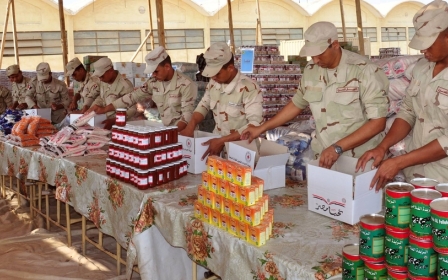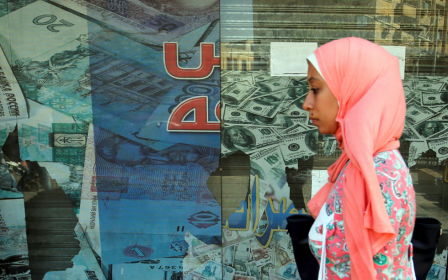Egyptian doctors ordered to reuse syringes

Doctors are being told to reuse syringes on patients because of a chronic shortage of medical supplies, according to a doctor's union leader who called on the president of Egypt to resolve the crisis.
Undersecretary of the Egyptian Doctors Syndicate, Mona Mina, called on President Abdel Fattah al-Sisi to resolve a crisis in medical supplies at Egyptian hospitals after hearing that doctors were using syringes twice.
Mina made her call in a phone-in with the Manchette talk show on the privately owned satellite channel Al-Asema (The Capital) on Tuesday.
The veteran leftist activist said that medical staff at a government hospital had received orders to reuse syringes on patients due to shortages in medical supplies.
“I received a text message from one of the young doctors. It was [basically] a cry for help,” Mina told the TV host.
“He said doctors had received orders to use half the medical supplies they require ... including syringes, kidney dialysis machinery … because there simply isn’t enough [to go around].”
Mina went on to explain: “A patient who may need two bags of saline solution will only use one… [and] each syringe will be reused.”
But while Mina was horrified by the situation, she seemed to excuse the malpractices because of the dearth of supplies.
“These [practices] are of course against health and safety regulations… but when hospitals only have half the amount of supplies they need…what can they do? None of us can make the equipment, we simply use what we have,” she said.
Mina also went on to say that the largest hospital in Upper Egypt was turning away patients because of a lack of equipment and medical supplies.
“We received verified news a week ago from the Asyout University Hospitals confirming that outpatient clinics had been closed down to save on medical supplies for emergencies,” said Mina.
Ministry of health to sue Mina
A few hours after the television show was aired, an official in the Egyptian Ministry of Health said on Wednesday that the ministry will be suing Mina over her statements, reported the Egypt Independent.
Assistant Health Minister Ahmed Mohie al-Qased said he charged the legal affairs department to start legal procedures against Mina over the "syringes statement", which he described as "lies and unreasonable".
Qased called on Mina to head to the prosecutor general's office and deliver any evidence that proves the authenticity of her claims, rather than spread confusion in society.
Qased added that the ministry has a stockpile of medical supplies to ensure that the demand of hospitals is met for at least two years.
Egypt’s economic crisis
Egypt has been struggling to boost its economy amid the political turmoil following the January 2011 uprising that toppled former ruler Hosni Mubarak.
The country is facing a currency crisis that has left millions of people struggling to afford basic items, including food and medical supplies, and has led to street protests and unrest.
The pound had fallen to record lows on the black market and the central bank floated the currency on the 3 November in an effort to attract foreign investment.
Egypt has been trying to attract investment and restore growth by rolling out an austerity programme, including subsidy cuts on key goods, in the hope of meeting the IMF's conditions for delivering a $12 billion loan which was approved on Saturday.
The country's foreign currency reserves stood at $19.6bn in September, an increase from previous years but less than 50 percent of the level in early 2011.
Middle East Eye propose une couverture et une analyse indépendantes et incomparables du Moyen-Orient, de l’Afrique du Nord et d’autres régions du monde. Pour en savoir plus sur la reprise de ce contenu et les frais qui s’appliquent, veuillez remplir ce formulaire [en anglais]. Pour en savoir plus sur MEE, cliquez ici [en anglais].




